The government through the Ministry of Investment, Trade and Industry (MITI) aims to increase its target for the installation of direct current (DC) fast chargers to 1,500 units by 2025.
In connection with this, MITI will collaborate with the state governments of Selangor and Johor to ensure that each district has facilities for electric vehicles (EVs).
According to Deputy Minister Liew Chin Tong, this is part of the initiative to maintain the target of 10,000 EV charging stations by 2025.
Currently, there are approximately 500 DC chargers nationwide.
He further stated, in response to a question from Khoo Poay Tiong (PH-Kota Melaka), that the government has implemented various initiatives to support the development of the EV ecosystem and local industry.
“As of September 30, 2024, a total of 33,319 electrified vehicles (xEVs), including hybrids, plug-in hybrids, battery electric vehicles (BEVs), and fuel cell electric vehicles (FCEVs), have been sold, representing 5.11 percent of total annual sales. Additionally, 3,354 charging bays have been installed as of October 31, 2024,” he said.
